Biography of Szama IGLICKI, aka Serge IGLICKI.
An account dedicated to our descendants – Established by Jean-Luc IGLICKI – December, 2012
Below, photos of Serge IGLICKI at the age of 20, at 48, and then at 65; lower, his wife, Tilly Lilienstein, at the age of 19, then at 46, and finally at 67.
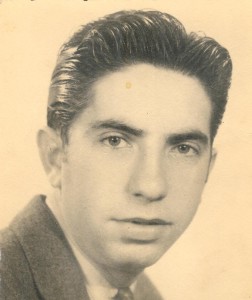 |
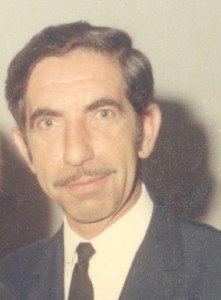 |
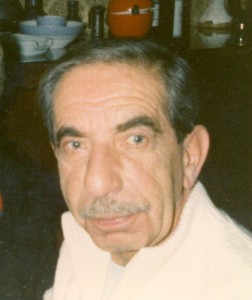 |
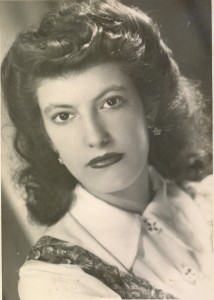 |
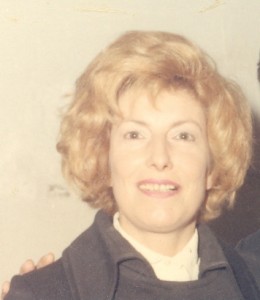 |
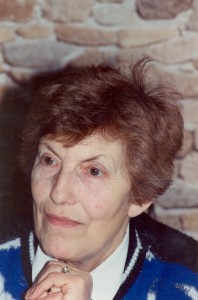 |
To the memory of Szama (Serge) IGLICKI – Our dad.
Szama (Serge) IGLICKI was born officially on October 16, 1923, the third child (second son) of David IGLICKI and Perla MILGROM. He was born at IRENA (Poland), which is today incorporated into the city of DEBLIN about 80 kilometers (50 miles) from Warsaw.
We say “officiallyˮ born, because it is said that he accompanied his mother to the Irena Town Hall to declare his birth…
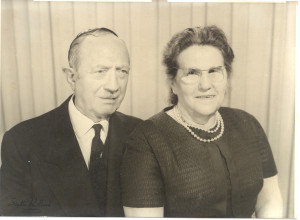
David IGLICKI and Perla MILGROM, the parents of Serge (Szama)
Our grandparents (Alain, Michel, Jean Luc)
There is a discrepancy of two years between his actual birthdate and the official one. He was thus born on October 16, 1921. He was made two years younger so that he could attend class at school at a level he could handle on his arrival in Paris. He thus attended school, not for long, and left without any diploma, able to speak fluent French, but limited to phonetic spelling until the end of his life (just like a creole!)
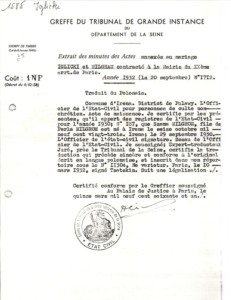
From what little is known about his life (he was never very loquacious), his family probably fled the anti-Jewish persecutions in Poland (which are known as the Pogroms) when he was about 10 years old.
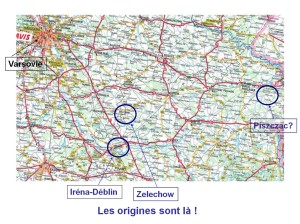 the origins are located there !
the origins are located there !
His mother Perla was born at Ryki in Poland in 1894.
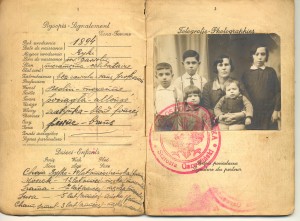
His older sister Chaya was born on December 19, 1915 at Irena, Poland.
His older brother Maurice (Moszek) was born on July 10, 1918 at Irena, Poland.
His younger sister Suzanne (Sura) was born on June 15, 1925 at Irena, Poland.
His younger brother Sam (Chaim, Szmul) was born on November 2, 1927 at Irena ? Poland.
They all departed to join their father David, who had left the village for “Americaˮ (Argentina, to be precise) over a year earlier. David (Dvis), born on January 20, 1897 at Zaleschow/Zelechow, Poland, had to break off his journey in Paris, for lack of money or for “love of the city” (?)
A long train trip was in store for them in 1931 — 30 days to cover 1800 kilometers (1118 miles).
Why did it take so long by train? They left Warsaw, where they were living, for Berlin. Taken in by Jewish associations under the authority of the rabbinates, they waited for their finances to be arranged. From Berlin they went via Cologne, where they were held up for a week, to Frankfurt and then to Basel in Switzerland, where they received a very pleasant, even princely welcome!
“Why do you want to go to Parisˮ? “Do you know where you husband is”? Szama’s (Serge’s) mother was asked. “Here is the address; everything is in order,ˮ she answered.
Once they finally got to Paris they were all seven reunited in a small (12 square meters – 130 square feet) flat.
At that time the adults and the children worked in a garment factory manufacturing “Schmatès” (very approximate spelling). Today we would say “threads or togsˮ).
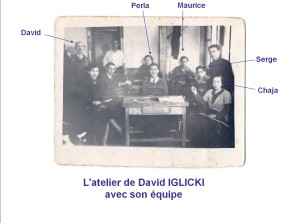 the workshop of David IGLICKI and his whole team.
the workshop of David IGLICKI and his whole team.
The War
In 1939 there were 9 children in the family: Chaya, Maurice (Moszek), Serge (Szama), Suzanne (Sura), Sam (Chaim), Albert, Jeannette, Léon and Lazare.
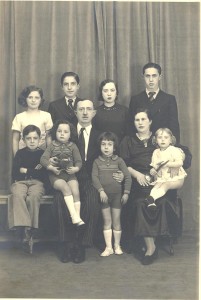 |
David and Perla IGLICKI and their family in 1937 From left to right Back row: Suzanne, Serge, Chaya, Maurice In front: Sam, Jeannette, David, Albert, Perla, Léon
|
David, the father, was the very image of the convivial, life-loving character in the Belleville neighborhood. He was liked by everyone.
That is probably what saved him, as he was forewarned of the police roundups and thus evaded the worst.
Of all the siblings only Maurice was taken prisoner in the war. “Where are you from?” asked the German who arrested him. “From Poland,ˮ he replied. “Ah, I see, from Bologna (in French, one can be mistaken – willingly or unwillingly, Pologne and Bologne are very close) c. Okay, go over there…” As they thought he was from Italy, he was not deported, living as best he could for a while as a war prisoner, before escaping rather easily and in good shape.
Serge (Szama) was not so lucky; living in Lyon under the name of Serge Dimoine, he was turned in.
Turned in, imprisoned, grouped with others at Drancy and deported…
“Monsieur Serge IGLICKI, deported to Auschwitz in convoy n° 77, departure from Drancy on July 31, 1944.ˮ Upon arrival in Auschwitz, he was tattooed the registration number B3731 on the forearm. He received another registration number in Dachau : 139262.
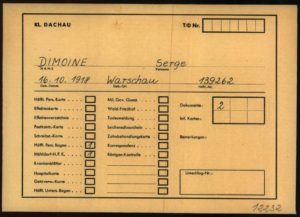
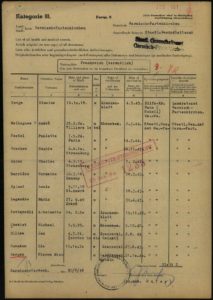
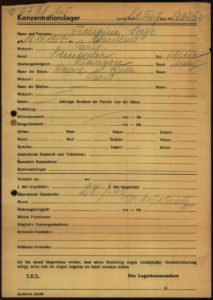
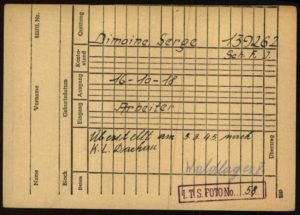
He was to survive this terrible ordeal, along with his campmate, Michel RACIMOR (“Monsieur Michel RACIMOR, deported to Auschwitz in convoy n° 77, departure from Drancy on July 31, 1944ˮ).
In the camp they were assigned the extremely dangerous job of defusing unexploded bombs dropped by the Americans and Russians in the area in 1944-1945.
Mine detectors would not operate and the deportees were used as substitutes. It has been said that Serge (nothing certain, just memories possibly distorted with time) unloaded remains from the crematorium before volunteering for the mine kommando for an additional bread wedge.
Practically nothing is known of how they lived (or rather survived) at Auschwitz.
It is not known which of the two “mates” saved the other? But the bonds that united them all through their lives would seem to be evidence of an act of this type… in a context where death was a constant presence.
In this period of time, Lili who was to become Serge’s wife (and mother of the author), behaved exemplarily during the war. To begin with, she took care of her family by some black market activities (no other way possible). To this end, she would bike from farm to farm in the Loir et Cher, sometimes with her little brother Henri.
In Grenoble, she was involved with the résistance, fearlessly afraid of nothing : she would deliver goods to the maquis (food ? weapons ?). She was arrested and taken to jail in Grenoble, then in Montluc, Lyons. She was freed from there, and the author never learnt how this was made possible.
Serge and Michel survived the “death marchˮ organized by the Nazis from Auschwitz to Dachau… This march, implemented to bring the prisoners back behind the lines into Germany, had the secondary effect (or perhaps objective) of finishing off the many “living dead”. There are at least 800 kilometers (500 miles) between the two camps!
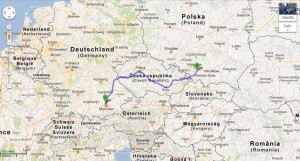
“During these death marches the SS guards brutally mistreated the prisoners. Obeying explicit orders to shoot any prisoner who could no longer walk, they killed hundreds of them on the road. Thousands of prisoners also died of cold, hunger, and fatigue. The death marches were particularly numerous from the end of 1944, for the Nazis were trying to transfer the prisoners inside Germany. The biggest ones began at Auschwitz and Stutthof just before Soviet forces liberated the camps.”
Serge, liberated by the Americans on July 16, 1945, was put up in the Lutétia Hotel in Paris.
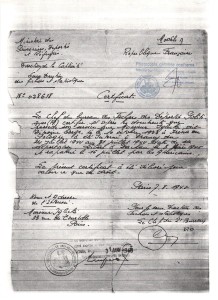
Ill, virtually crippled, he weighed 30-35 kilos (66-77 lb.) and suffered from a paralyzed leg (or pelvis). He was long considered doomed, until a physical therapist from Lesparre (near Bordeaux), called Doctor CHAPELLAN, though he was only a therapist/chiropractor, saved his life (once again) using some American technology, or perhaps thanks to some form of treatment of which we are ignorant.
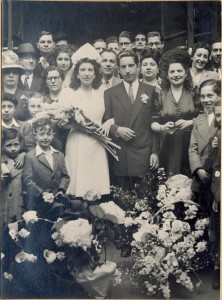 |
On May 1, 1946 Serge married Tilly LILIENSTEIN, herself born on May 14, 1923 in Germany.
|
Their marriage produced three sons:
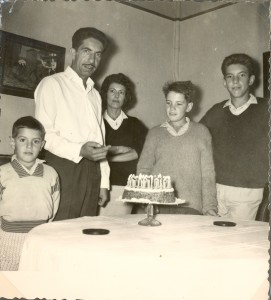 |
The family in 1961 in Bazas (on Serge’s 40th birthday):
Alain, born on June 16, 1947, married to Marie-Claude CAZALOU, is the father of three sons: Stéphane, Patrice and Philippe, and has five grandchildren: Alexandra, Vincent, Chloé, Simon and Eloïse. Michel, born on August 14, 1949, married to Nadia BARBE, is the father of two daughters, Karine et Emmanuelle, and has three grandchildren: Maxime and Axel GIL, and Nolan ADELINE. Jean Luc (nicknamed Nano), born on May 4, 1954, married to Christine CHAPUIS, is the father of three daughters (Alice, Marie, Cécile). As of this date (December 22, 2012), there are no grandchildren…
|
|
The three sons in April, 2006:
In back, from left to right Michel, Jean Luc (Nano), Alain
In front: Frédérique (Josette), Serge’s niece and her father Maurice, Serge’s brother and perpetual sidekick |
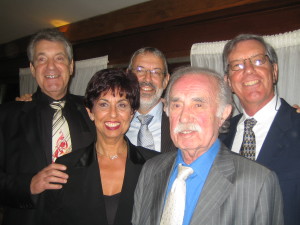 |
History
Diplomaless, but creative, inventive, hard-working and a born businessman, Serge took Tilly (called Lili all her life) and their three sons to various French towns and villages, where he set up his successive “factoriesˮ for the manufacture of “Schmatèsˮ (clothing):
– Impasse Truillot, in the 11th district of Paris, near the Boulevard Voltaire, at the St Ambroise subway station, a small shop employing 4 or 5 people around 1950-1954. The family lived at the time at n° 10 rue Félix Langlais (subway: Liberté).
– Then the shop on the Impasse Truillot became too little for Serge’s projects and he opened a new one at Fontenay-Trésigny, in the Seine-et-Marne department to the east of Paris around 1955 on the premises of a former manufacturer of galoshes on the rue Bertaux. The new factory employed up to 60 people and attracted covetous attention. The company was bought out to make way for a large expansion. He was promised to remain as boss, but soon ousted.
– He moved on to Sissonne in the Aisne department in Picardy in the summer of 1959 to join up with his sister Suzanne, who had set up in business there with her husband Henri (called Riton). Suzanne and Riton soon left Sissonne, leaving Serge alone with an enterprise employing up to twenty people.
The company did well, but the family for some unknown reason lived in poverty.
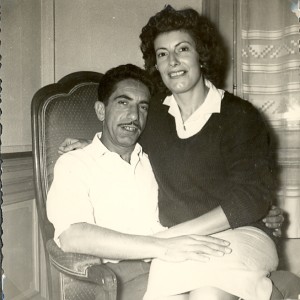
Lili and Serge – 1960
– Finally, he was called by Gérard Bonnac, the town clerk, to Bazas in 1960-1961, to set up a factory and further local employment. (Lili and Serge had frequently vacationed in the Gironde department since 1950 and had many acquaintances in the area.)
He spent a good part of his life in Bazas.
Serge was an eminent citizen of the town, at the head of the Jahis Company until its decline, then as boss of the “Bazadaise du Vêtement”, one of the main employers of the town of 5000. The Société Bazadaise du Vêtement (SBV) would eventually have 120 employees.
Thus, he was a “successˮ. Well-known on the social scene, he was able to offer his family a tranquil life financially, with some ups and downs, and even a few way downs.
When the JAHIS Company was liquidated, all of Serge and Lili’s belongings were sold at auction.
Alain recalls that at that auction all their goods, piece by piece were snapped up by the old campmate Michel.
“Uncle” Michel bought everything and put it all back in Serge’s home.
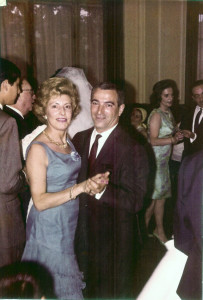 |
Lili dancing with Serge’s “campmateˮ:
Michel Photo taken in 1966
Serge and Michel were to remain inseparable. Not a week went by without their seeing each other, with or without their wives’ consent. Until Serge moved to Bazas, 600 km (370 miles) from Paris. After that they met less often, but they always knew they could count on each other.
|
| Uncle Michel and Marie (RACIMOR)
Marriage of their daughter Madeleine with Robert
November, 1968
|
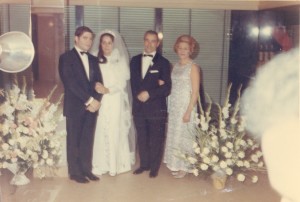 |
Serge financed his children’s studies, and above all kept trying to pull Lili out of her perpetual “fear of tomorrow”.
La Bazadaise clothing shop closed in 1975 after Serge’s last bankruptcy.
In all his undertakings Serge dealt only with design, sales, and production, leaving management and administration to others (to Lili during their time in Bazas).
Afterwards he held modest jobs in Paris and then in Cluj, Romania. This eventually led him to take Lili (the children were by then independent), to Pessac in the Gironde department, then to Noisy-le-Grand, and finally to Neuilly-sur-Marne, where they lived in a modest apartment from 1977 on.
In February, 1989 Serge had a stroke.
Taken to the hospital at Bry-sur-Marne, he was diagnosed with a fairly advanced generalized cancer.
He ended his days on July 6, 1989 at Juvisy in the Paris area at the age of 68.
The transmission
This “fearˮ runs through the heritage he left his children.
Against their will Serge and Lili saddled us with duffel bags full of fears that are doubtless what is hardest to empty.
Fear of tomorrow (no doubt linked to hunger) has not proved indelible. Yet Lili was always afraid, going so far as to hide envelopes full of banknotes at Sissonne, and then later at Neuilly-sur-Marne. She only rid herself of this fear at Serge’s death, when he convinced her that he was leaving her enough to get by each month and with no uncertainty.
The fear of being Jewish and having it known stayed with us for a long time and could well come back. Alain was catechized and found out what “being a Jew” meant only when his schoolmates were getting ready for their first communion, which he was not allowed to do, as Boubée, his grandmother, intervened.
And there was even fear of a return of Nazism and war, so strong that Lili wanted to protect Alain and Michel by enrolling them in Sissonne’s brass band, because “the buglers are not put in the front linesˮ.
From them we have also retained a certain skill for self-protection. Safeguarded behind a shell that is hard to crack, we are difficult for others to truly get to know.
Serge, who could appear cold, often authoritative (a bit macho?), and sometimes harsh, had an unbending character and a heart of gold.
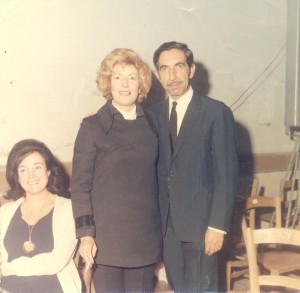 |
Serge and Lili
1969
With a friend: Maguy LOPES |
Deeply hidden behind all that was a just, kind, loving person.
Children, grandchildren, great grandchildren (etc…), if you recognize yourselves in these lines, know where you come from!
It is important to add that Serge and Lili have also transmitted to us (despite what they both lived through) a deep faith in mankind. The way they lived and brought us up in these difficult circumstances made humanists of us. They rejected any hatred for the Germans, unlike Michel, the campmate, and especially his wife Marie, also a former deportee.
Alain, Michel and Jean Luc (Nano) love people and social life, and they probably owe that to Serge and Lili.
They also bequeathed to us a strong sense of family and hospitality. For Serge the family was sacred. It was he who vainly attempted to bring those of his brothers who had fallen out back together.
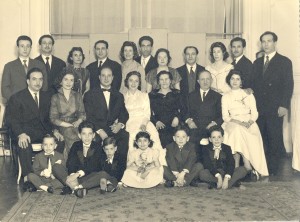
The IGLICKI family around 1960
From top to bottom, left to right:
Lazar, Léon, Marie Lou, Sam, Lili, Serge, Chaya, Armand, Hélène, Maurice, Albert
Riton, Suzanne, Jacky, Jeannette, Boubée (Perla), David, Claire
Marc, Alain, Nano (Jean Luc), Josette (Frédérique), Patrick, Michel
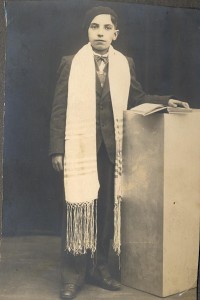 |
They have left us nothing, however, of the Judaic tradition, not the least ounce of religious faith, to the point that with zero opposition all three brothers married a goy (non-Jewish).
And yet Serge had been brought up in the Jewish tradition and religion.
Photo of his Bar Mitsvah in 1934
We, his children, still have cultural traces of Judaism, of its tradition and identity, but nothing whatever of the religion. |
The man
And paradoxically perhaps (or perhaps not, after all) Serge and Lili, but most especially Serge, bequeathed to us an incredible love of life (written by Jean Luc).
Something like the last frame of “From Here to Eternityˮ…
Alain adds, “and not just love of life, but also the constant desire to relish life.ˮ Particularly Serge, who openly displayed that enjoyment, spending lavishly when he had money or thought he would soon, on cars, restaurants, and everybody else — his sons and their families — on a ski vacation in Cauterets at a time when la Bazadaise was about to go under.
He took us to spend nights at the LUTETIA HOTEL (which had become a luxury Parisian establishment). Perhaps to get even with life?
| Serge dancing with Lili
1975
They seem to have loved dancing.
|
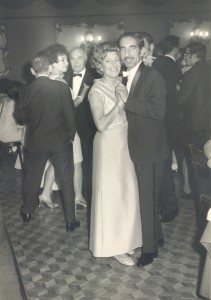 |
With each glass — and we are downing a few — we propose a toast with a clear and sincere “Lechaimˮ (“Glory to Lifeˮ)!
|
Partying with his son Nano (Jean-Luc)
1970 .. Carnival?
Nano masquerading as a woman dancing with his dad It looks like a big hug |
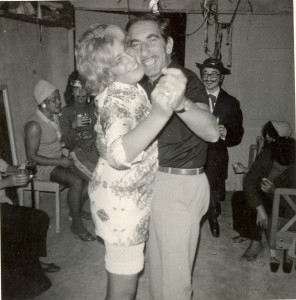 |
Serge and Lili were full of love. He may never (or very seldom) have pronounced the word, but his whole person exuded it. Maybe another bequest?
He was loved by the grandchildren (Stéphane, Karine, Patrice, Emmanuelle and Philippe) and the daughter-in-laws (Marie-Claude, Nadia, Christine) who knew and remember him.
It appears (at least some think and say so) that children choose the parents with whom they want to live their lives.
Jean Luc is happy to have chosen Serge and Lili as his parents. I am what I am because I am Serge and Lili’s son.
And should they read these words… I thank them.
Jean Luc (Nano) – December, 2012
Strongly supported by his brothers, Alain and Michel (with thanks)
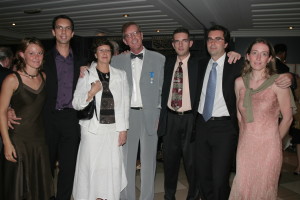 |
Family of Alain and Marie-Claude IGLICKI
Alain’s reception ceremony of the Order of Merit:
From left to right: Claire, Philippe, Marie-Claude, Alain, Patrice, Stéphane, Nathalie
|
| Michel and Nadia IGLICKI
2010 |
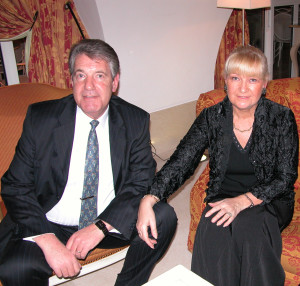 |
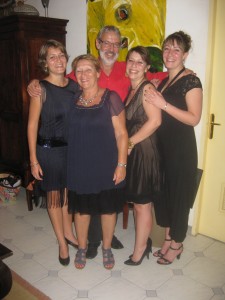
IGLICKI Jean Luc (Nano) family
in December 2009
Cécile, Marie, Christine, Nano,
Alice (today mother to Léo, and soon a small brother or sister to Léo)
Serge and Lilly, your upspring is today comprised of
3 sons
8 grand children
9 (soon 10) great grand children
Nice revenge on life ! Is’nt it ?


 Français
Français Polski
Polski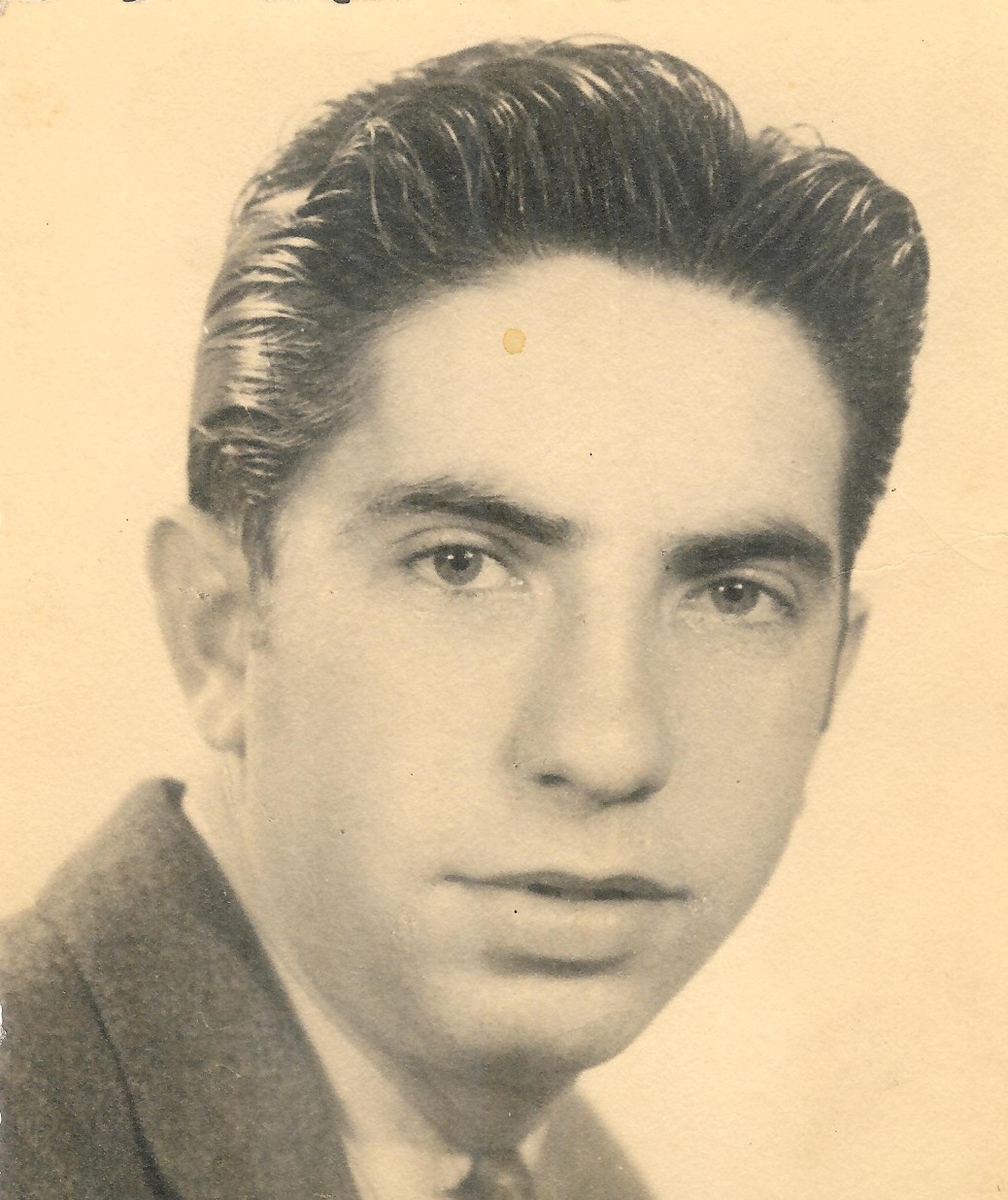











Quelle émotion de revivre mon enfance près de Serge et Lili à travers ce document ! La famille Iglicki a remplacé la mienne, disparue dans les camps, depuis ma naissance. Jeux avec Alain, Michel et Nano. Tendresse avec Lili. Connivences avec Serge. Fêtes de famille au grand complet… bises à vous tous.
Madeleine, fille de Michel, le frère de camp.
Chère Madame, nous sommes très heureux d’avoir, même modestement, contribué à votre émotion de ce jour. En tant que représentant de notre association, nous aimerions également documenter, puis publier, avec votre autorisation , la biographie de votre père MIchel RACIMOR, lui aussi parti par ce convoi 77. Nous sommes à votre entière disposition pour vous y aider. Enfin, si vous êtes sensible à notre action et à nos résultats, merci de rejoindre notre association. Bien cordialement.
Serge Jacubert, fils et neveu de déportés de ce convoi.
Bonsoir,
Je vais réfléchir à l’écriture d’une biographie de mon père. Je serais heureuse de lui rendre hommage.
Je vous tiendrai au courant. Merci de me donner une adresse mail pour les échanges.
Bien à vous,
Madeleine
Bonjour, contact mail établi. Merci pour votre action.
Shalom alekhem Nano !
C’est une bien belle histoire, j’ai pris beaucoup de plaisir et j’ai éprouvé énormément d’émotions à voyager dans le temps avec la famille Iglicki.
Certains souvenirs malheureusement sont plus difficiles que d’autres …
Mais au final la joie, la vie et l’amour ont triomphé de tout le reste !
Longue vie remplie de bonheur d’amour et … de bons vins.
Shabbat Shalom !
Bonjour, la famille,
C’est un document très émouvant. Si je pouvais faire une suggestion : vous pourriez l’éditer, en livre, par exemple, et pour le moins le distribuer à la famille, aux associations de déportés, au Mémorial de la Shoah et à Yad Vachem. Ce témoignage le mérite. (J’ai l’expérience de ce type de publication, pas chère du tout.)
J’ajouterais quelques points que je connais.
Le premier atelier de Serge se trouvait Quai de l’Hôtel de Ville, à Paris, probablement au 72 (?), dans un ancien bordel de la guerre désaffecté. Mon père, sinistré total, avait reçu une pièce dans ce bordel, à la Libération, où nous avons vécu (mon père, Lili et moi) peu de temps. Il l’a cédée à Serge, après son mariage, qui en a fait son atelier. Je lui ai plusieurs fois rendu visite, et une fois, un mois d’août où il faisait très très chaud, nous sommes (Serge et moi) allés nous baigner dans la Seine. C’était encore faisable.
Sur sa déportation, selon ce que Serge m’a confié. Il a été un moment chargé de dégager les fours crématoires. De là, pour un morceau de pain supplémentaire, il s’est porté “volontaire” pour déminer. Les démineurs disposaient de détecteurs de métaux qui, de toute façon, ne fonctionnaient pas. Ils sautaient sur les charge des obus.
Bonne suite et bises à toute la famille,
Henri Lilensten
Bonjour, je vous ecrit de la part de David Luckowiecki, fondateur du groupe Facebook Jewish Zelechow. David a reussi a retrouvez plus de 600 descendants de ce village et le nom Iglicki y figure. Jetez un coup d’oeil. Il a des documents qui peuvent vous interesser. Je lui sers simplement d’intermediaire car il s’est appris le Yiddish ( pour lire les documents) est ne en Colombie ( certains zelechowers se sont retrouves la-bas) parle Espagnol, Anglais , Hebreu mais malheureusement pas le francais.